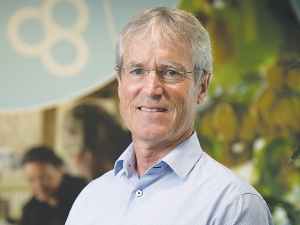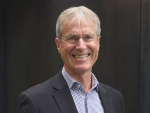Fertiliser co-operative Ballance, which has poured $70 million into the Taranaki project since 2019, says legal challenges of the past 24 months have been frustrating.
Outgoing Ballance chief executive Mark Wynne accuses Greenpeace of employing "lawfare" to block the project, which he says will help reduce carbon emissions in New Zealand.
In 2019, Ballance set up the project to build four wind turbines and has consent for 5MW of electrolysis for green hydrogen production and a hydrogen refuelling station. The turbines will supply renewable electricity directly to Ballance's Kapuni site and electricity will also be used to produce hydrogen by electrolysis - splitting water into oxygen for release into the atmosphere and hydrogen to make ammonia which will then be used to make green urea at the Kapuni plant.
The zero-emission hydrogen supply will also be used to replace imported diesel used for heavy transport under a project the fertiliser co-op has underway with local company, Hiringa Energy. Ballance currently uses diesel trucks to cart fertiliser up and down the country.
But the project stalled after Greenpeace and one local iwi appealed against the consent granted to Ballance in the High Court. However, 11 months ago, the appeal was dismissed. Greenpeace then went to the Court of Appeal, where a hearing was held in May and a decision is expected soon.
Wynne says they are hopeful of a positive outcome in the coming months.
"It's frustrating because ours was one of the first projects in the world.
"But here we are over two years later still stuck in the legal system. Meanwhile in Australia, which had no projects at the time, have now got 112 active projects in various stages of implementation," he adds.
"I look at this and say if we are trying to save the planet through decarbonisation, you cannot spend two years and millions of dollars locked up in what I call lawfare."
Wynne cannot understand why Greenpeace is blocking the development of green hydrogen in NZ when it supports green hydrogen worldwide.
Greenpeace spokesperson Amanda Larsson told Rural News that it supports the use of green hydrogen for heavy transport fuel.
"The trouble is that Hiringa and Ballance intend to use the hydrogen from this project to make urea fertiliser. Urea is an agri-chemical that pollutes the climate, rivers and drinking water. It doesn't matter if you make it from fossil fuels or green hydrogen, urea still causes all that pollution once it's applied to the land," Larsson claims.
Hiringa Energy chair Cathy Clennett says the wider debate about the use of fertiliser to keep New Zealand's pastures productve dows not belong in a court hearing about wind turbines creating renewable energy for producing hydrogen.
"Greenpeace has failed its supporter base by failing to engage and properly inform itself about this renewable energy and green hydrogen project, or even worse, distorting the facts."











